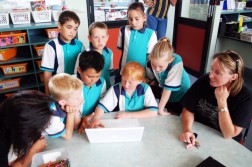At high school, the game I excelled at on sports days was hookey. It was easy enough to do just stay on the train into the city when the other girls disembarked at Turrella and drifted off to squash courts. Then I’d go straight to the State Library where I would bury myself in books on Islamic calligraphy or Moorish architecture.
My loathing of high school sport had not been intentional. Fired up by tales of English boarding school fiction one of the honourable ancestors of Harry Potter I’d been keen on learning the mysteries of hockey, but my school soon put paid to that. In the first few weeks of school, each girl was given a series of tasks to indicate her level of ball skills. At the end of the double period, I was still stuck on my first task: trying to get a ball into a basketball hoop. The school sports department used this test to select girls who should be treated as potential team players. The rest were ditched and wasted their Wednesday afternoons by pretending to play hockey on a local football field. Later we pretended to go ice-skating (I kept a copy of an Ian Fleming novel in my blazer pocket) and when I changed schools I pretended to play squash.
It was therefore with some surprise that recently I found myself arguing that one of the most effective ways to create widespread cultural ‘glue’ to bring communities together, would be to institute universal weekend school sports. The reason for arguing the value of sport in this context is that it is the one common value supported by the overwhelming majority of the Australian population. Sport has a higher status than any ideology or mass entertainment and, therefore, a sports connection has a greater chance of success in bringing people together.
At the moment, there are two networks running weekend sports events for children. There are the sporting clubs, where those children who are interested in sport and whose families can afford it, learn from basics to elite competition the nuts and bolts of different games. The children who miss out here include the poor and the culturally alienated.
At the same time, and often on the same sporting fields, there are other sporting fixtures run by non-government schools’ networks. The difference is that, in this latter case, every child at the school is involved in a game. Sometimes, there are professional coaches but classroom teachers can also be coaches, which means children see their teachers in a different context. When outside coaches are employed they are often former school champions, taking an extra job during their university studies.
In both cases parents are involved ferrying their children to different fixtures, and meeting with other parents from the team. It means that connections are made, parents are not separated from the life of their child’s school, and they are drawn into meeting their children’s friends. Despite the high-profile teams from some schools, most school sport can hardly be described as ‘elite.’

When my son began to play soccer I think he managed to kick the ball once in his first season. His team made Nerds FC look like champions; they lost one game 17:0. Weekly training plus a Saturday sporting fixture does, however, promote some level of fitness, ball skills and a sense of camaraderie.
Over the years, they learnt that by playing together they could sometimes outclass larger and superior players. The one star player of the team in Year 7 the goalie who saved them from even greater humiliation later became school captain.
The English teacher who was their coach also managed to pull many of them into an understanding of words and language. It was an effective crossover. Parents carpooled and became friends. The school principal was in the habit of looking in on most sports each Saturday using the opportunity to meet and greet the parents as well as making every child feel special.
From such small gestures communities are made.
For me, the big scandal in Australia’s national obsession with sport is that it is firmly focussed on the elite high-achievers the world record breakers, the gold medal winners. At a time when there is a well-recognised problem with childhood obesity and a reduced level of national fitness in Australia, this country rolls ever more money into East German style academies.
If some of the money now spent on elite sport could be redeployed into creating partnerships between local schools and local clubs, and weekend sport becomes an experience shared between child, school and parent, then we might also see a growing sense of community.
Donate To New Matilda
New Matilda is a small, independent media outlet. We survive through reader contributions, and never losing a lawsuit. If you got something from this article, giving something back helps us to continue speaking truth to power. Every little bit counts.



